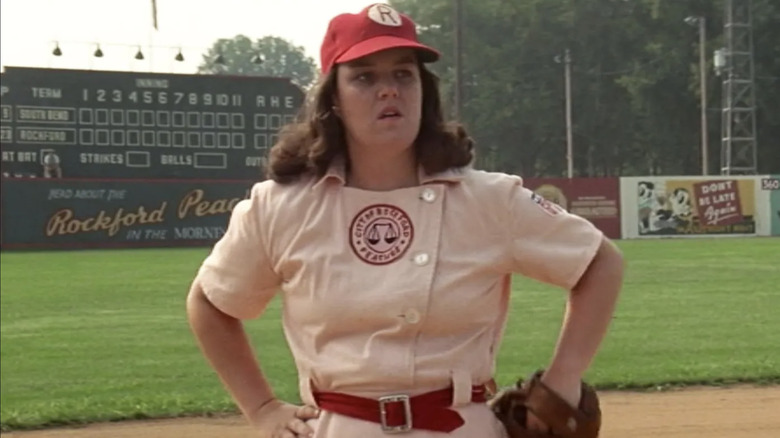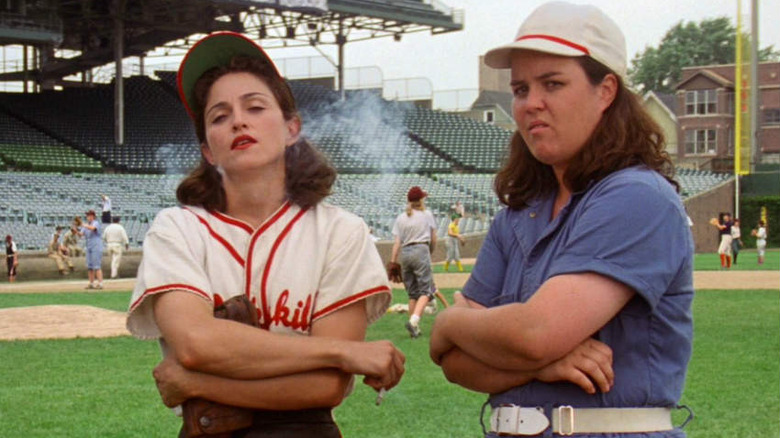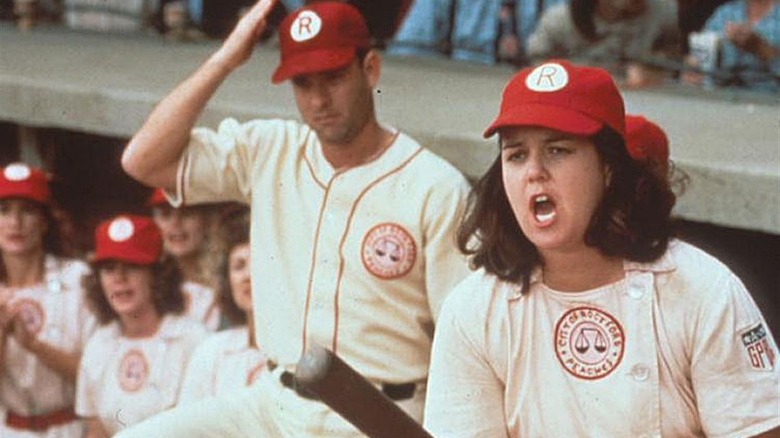Rosie O'Donnell Defied The Director To Keep Her A League Of Their Own Character Gay
Based on the beloved 1992 film of the same name, the new Prime Video series "A League of Their Own" is an American period sports comedy drama co-created by Will Graham and series star Abbi Jacobson, about the historical formation of a World War II-era women's professional baseball league. The original film directed by Penny Marshall is viewed as a seminal, feminist classic, despite the limitations of 1990s social politics rendering it impossible for the film to have been as intersectional as the lives of the real people the film is based on.
Now, in a more progressive climate, "A League of Their Own" is able to explore how segregation impacted the Black women who wanted to play in the All-American Girls Baseball League, and finally bring the factual queer identities of the players to center field. Queer women have cited "A League of Their Own" as a source of "awakening" for generations, including Abbi Jacobson herself.
While the original "A League of Their Own" is not explicitly queer, one lesbian icon prevailed despite all odds: Rosie O'Donnell as third base player Doris Murphy. It would be another 10 years before O'Donnell herself would come out as gay, but she made sure to do her best to tell Doris' authentic story, even when Penny Marshall couldn't see what the text already knew — that the character was gay.
Doris was gay because the All-American Girls Baseball League players were gay
O'Donnell made a cameo appearance in the new "A League of Their Own" series as a bartender at a local gay bar, a role that she's sure would have made Doris proud. In a recent interview with Vanity Fair, O'Donnell talked about the making of the original film, and her determination to portray Doris as gay even when no one else could see the obvious queer-coding of the character.
"When we did the movie, there was that one scene [where] I'm on the bus: 'I never felt like a real girl or even a girl, but now I see there's a lot of us, we're all okay.' To me, that was her saying she found her tribe, right? There were gay women or athletic women or women like her, and my character, I thought, was in love with Mae and didn't maybe know how to express it. But it was 1991 when we shot it, or 1990, and the times were different. You don't realize until you're sort of faced with the new show what it could have been."
The queerness of the All-American Girls Baseball League is not something Prime Video threw into the new series for "woke points" or whatever other garbage nonsense detractors are trying to claim, and O'Donnell confirmed this even when they made the film in the early 1990s. "When we met the real players, who were in their 70s—80s, some of them — they would say, 'Oh, this is my roommate, Betsy,'" said Rosie. "I'm like, 'Oh, how long have you been roommates?' [and they'd say] 'Oh, 27 years.'"
'Don't do it so gay.'
Rosie O'Donnell said that after shooting the bus scene in question, Penny Marshall recognized what she was doing and told her, "Rosie, don't do it so gay." She claimed that she was performing the character as written, but something about her performance was reading "gay" to Marshall, which makes complete sense considering she was watching a closeted gay person play a closeted gay character. "I did it the same way each time, because that was the way it was real to me," Rosie said. "A League of Their Own" has been hailed for its queer portrayals, something that didn't feel possible when the film was shot in 1990/1991.
"There was no 'Will & Grace,' there was no Ellen [DeGeneres] being out," she said. "I don't think anyone thought, 'Oh, well, they're really leaving out the gay stuff.'" While the queerness was canonical to the real life players the film and series are based on, "there were lots of cultural events for the gay community that we hadn't yet lived," said Rosie. She continued by saying that she finds what Jacobson and the rest of the cast has created as "touching," and how they were able to take these very real stories of Black women and queer women in the league and open it all up to a new audience and worldview.


